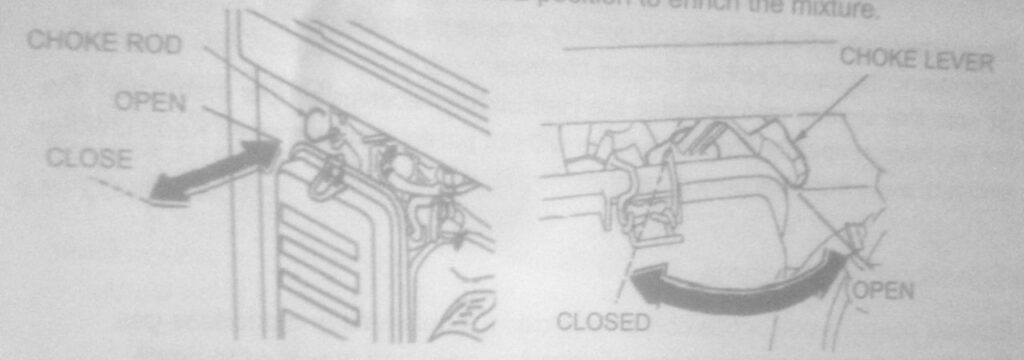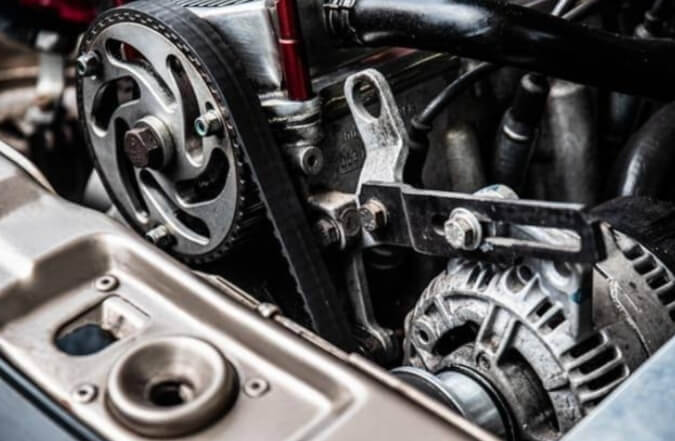As an Amazon Associate, we earn from qualifying purchases. This does not affect the price you pay or the quality of the products you buy. For more information, please read the full affiliate disclosure here.
Let’s say you are having fun with your family, or you are powering your outdoor equipment, and all of a sudden, a power outage happens.
Hopefully, you have a generator that runs on gasoline, so you aren’t much affected by the power outage since you can still run your generator
But something happens “The generator only runs on choke” Why?
Like when you choke the generator and return it to the choke to run it either runs rich, fluctuates, or off immediately.
You become frustrated about what to do — you need this generator running fast to complete what you are doing, but unfortunately, you can’t keep the generator running on choke.
If this sounds like what you are going through, don’t worry! Generator Hacks and its teams of professionals are here to help with troubleshooting expert tips to fix the issue.
So, in this article, we will delve into the reasons behind this behavior and explore effective troubleshooting steps to address the issue.
So What’s Generator Choke All About And Why is it Important in Generators?

I wanted to delve directly into the reasons why your generator is behaving this way, but I understand that, if I do so without explaining what choke is, it might then turn out bad for some.
Choke in simple terms is a valve or plate located in the carburetor of the generator that regulates the flow of air into the engine.
When the choke is engaged, it restricts the airflow, enriching the air-fuel mixture, which is necessary for starting a cold engine.
When you pull the choke, it creates a richer fuel mixture, making it easier for the engine to start.
As the engine warms up, the choke gradually opens, allowing more air to mix with the fuel, leading to smoother running.
However, if your generator continues to run properly only with the choke on, there might be an underlying issue that needs to be addressed.
Trouble with your generator? Get expert personalized troubleshooting tips tailored for you alone directly to your email. Contact us now for reliable support and practical solutions. Let’s fix it together – reach out today!
Common Reasons for Generators Only Running on Choke
Several factors can cause your generator to function properly only with the choke engaged which means something’s wrong.
And when that happens, it’s important to identify the root cause to apply the correct solution. Some common reasons include:
1. Dirty or Clogged Carburetor: One of the main reasons your generator will run on choke is the carburetor. Whenever the carburetor is dirty, clogged, or has accumulated debris, it can hinder the generator from receiving an adequate flow of fuel, resulting in a generator that struggles to run without the choke.
2. Fuel Delivery Issues: Another reason why your generator would run on choke is if there’s an insufficient fuel supply due to a clogged fuel filter or a faulty fuel pump. Apart from the carburetor clogging of dirt, there factors like water in the fuel tank, dirty fuel filter, and many more can reduce the amount of fuel estimated to flow through the carburetor when needed.
3. Spark Plug Problems: Not in most cases though, a damaged or worn-out spark plug can also lead your generator to run on choke. This happens due to incomplete combustion, causing the engine to run roughly and rely on the choke for stability. And like I said, not in most cases, but if you did want your generator to last longer, after fixing the issues—make sure to also check the spark plug.
Also Read:- How to Fix a Generator Spark Plug: 5 Top Ways
Side Effects of Leaving Your Generator Running on Choke
While running your generator on choke might provide temporary relief, it has some adverse side effects on its overall performance and efficiency:
1. Increased Fuel Consumption: When you continue running your generator on choke for a long period, without fixing the issue of what causes it that way instead of running normally, you would notice a higher fuel consumption. And when it comes to repairing or maintaining the generator, the operation coat will also be at risk due to the generator running on choke which might have caused other damage to the generator engine.
2. It Causes Potential Damage to the Engine: Secondly, generators running with the choke on for a long period can cause damage to the engine due to irregular combustion and excessive fuel buildup. The carburetor might also get damaged and not be able to work again unless you replace it with a new one.
3. It Reduces the Performance and Efficiency Of the Generator: A generator that depends on the choke will not deliver its full power capacity and may experience a drop in performance and efficiency. At times its voltage might fluctuate to either high or low putting the appliances you are running on it.
How to Troubleshoot a Generator Running Only on Choke
Resolving the problem of a generator running only on a choke involves a systematic approach. Follow these steps to diagnose and address the issue effectively:
1. Turn off The Choke: Start by turning off the choke and observing the generator’s behavior. Note any specific sounds, vibrations, or irregularities.
2. Clean the Carburetor: You aren’t sure if the carburetor might be the cause. So, after turning off the choke and the generator is off, start by cleaning the carburetor to remove any dirt in the carburetor.
Clean it thoroughly by removing the time jets and all other components on your generator carburetor.
If that’s done properly, it can restore the proper fuel flow and mixture, allowing the generator to run without the choke.
For proper cleaning of your generator’s carburetor: check out this video:
3. Check the Fuel System: After you are done cleaning the carburetor, check out the fuel system. Inspect the fuel filter, fuel lines, and fuel tank for any blockages or malfunctions. When you check and find anything questionable, make sure you clean or replace any faulty components that need replacement.
4. Inspect the Spark Plug: The spark plug and the combustion valve work in hand—they are at the same location. Examine the spark plug for signs of damage or wear. If necessary, replace it with a new one to ensure proper combustion.
How to Prevent Choke-Related Problems in the Future
There’s this adage, “Prevention is always better than cure” Even when it comes to generator maintenance, it’s always good and advisable you prevent your generator from everything that would cause it to damage.
But how can you prevent your generator from choke-related problems? It’s easy. Having said that, let’s check out some measures you can take to avoid choke-related issues in the future:
1. Regular Maintenance and Servicing: Thousands of tips on the internet when it comes to generators. But the first thing you will be advised on is to adhere to the manufacturer’s maintenance schedule and have your generator serviced regularly by a qualified technician.
What they are trying to say is that you should always check your engine oil, check your tank for any dirt, and many more. This advice is premium for generator owners except if you want your generator not to last long, then don’t adhere to it.
2. Proper Storage and Usage: Secondly, storing your generator in a dry and well-ventilated area, and the way you store the generator matters a lot. There are guidelines for you to follow when it comes to the proper storage of generators. And I think we already have an article on that. Here’s the article:- How to Store a Generator: Best Practices for Long-Term Storage
3. Using Quality Fuel and Additives: The fuel and additives you use also contribute to how long your generator can last. In that case, always use high-quality fuel and consider using fuel additives to keep the fuel system clean and efficient.
Final Thoughts
If your generator only runs on a choke, it can be indicative of underlying issues that need urgent attention.
Hence, understanding how the choke mechanism works and troubleshooting the problem step-by-step can help you identify and resolve the issue effectively.
Additionally, don’t forget to regularly maintain and use your generator to ensure it operates optimally and provides reliable power when you need it the most.
Am I missing an important point in this article? And need to be adjusted? Don’t forget to contact us.
Frequently Asked Questions
1. How often should I clean the carburetor of my generator?
You should often clean the carburetor of your generator every six months or after extended periods of inactivity.
2. Can I use regular gasoline in my generator?
No, you shouldn’t use regular gasoline. The best you for gasoline generators is unleaded gasoline with a minimum octane rating of 87.
3. Why is the choke essential for starting a cold engine?
The choke is important for starting generators because it enriches the air-fuel mixture, making it easier for the engine to start in cold conditions. However, at times the engine is still hot, there’s no need for you to choke it.
4. Can I run my generator indoors during a power outage?
No, running a generator indoors is extremely dangerous due to the risk of carbon monoxide poisoning.
5. How can I prevent clogging in the fuel system?
To prevent clogging in the fuel system, use clean, high-quality fuel and add fuel stabilizers.
Share


